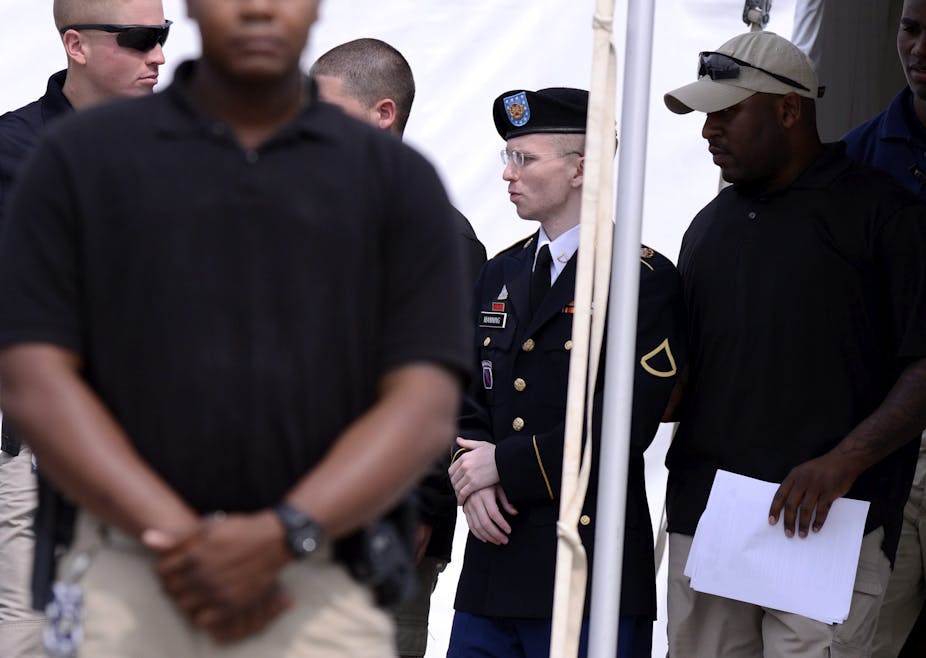Bradley Manning, the whistleblower behind the biggest leak of military secrets in history, has been sentenced to 35 years imprisonment. Convicted for six offences under the Espionage Act, he will have his military grade reduced to the rank of Private E1, be dishonourably discharged from the Army and will lose all pay and allowances.
The reaction of to the verdict is likely to be divisive. To some Manning will remain a hero, the whistleblower who stood up to the United States and paid a heavy price for doing so. To others he will be portrayed as a traitor, a danger to national security who should have suffered a far worse punishment than the 35 years suggests.
The reason for such polarised opinion is due in part to the way his disclosures were made. Manning, of course, did not take the route of leaking his information to a traditional journalist. Instead he used an online platform. While a traditional print journalist may have exercised a level of prior restraint, the Wikileaks organisation chose to release some of the leaked documents in a “raw” and unredacted form. Thousands of documents were therefore made available for the world to see, whether friend or foe.

The Manning episode also identifies the differences in editorial approach; The Guardian chose to report on the documents, yet declined the opportunity to republish the documents in full on the grounds of security. The option to resort to traditional methods of leaking to a journalist remains, however the recent events surrounding Edward Snowden, Glenn Greenwald and his partner David Miranda identify the difficulties in handling journalistic source material when it is placed in the jurisdiction of a NATO ally.
Those faced with few options and an overriding desire to make their concerns known are likely to resort to the internet as the fastest and surest way of disclosure.
New era of online leaking
The Manning situation is not likely to be a one-off event. Instead it should be indicative of a turning point that will lead to a new era of online leaking. Unauthorised disclosures using the internet can be seen as particularly advantageous to prospective whistleblowers. The internet provides a platform for the swift dissemination of material and can even provide a layer of anonymity.

The Manning situation - and now the Snowden revelations - identify that whistleblowing can engage different legal jurisdictions around the globe. The traditional legal methods used to deter and prosecute individuals for unauthorised leaking are out of date. The actions of those motivated to use the somewhat rusty and blunt legal instruments at their disposal have succeeded in prosecuting Manning.
However, the Snowden episode shows would-be whistleblowers may use the global stage to their advantage by seeking asylum in another jurisdiction. With a degree of legal knowledge, the information and the whistleblower can transverse borders with relative ease.
Advances in modern technology identify that whistleblowing organisations can be set up in legal jurisdictions with good shield law protections for journalists, meaning the journalists cannot be coerced into giving up their source. Or they can be mobile and move from jurisdiction to jurisdiction. Whistleblowers can seek protection in countries that do not have extradition agreements in place or do not have working relationships with the aggrieved jurisdiction to which the individual had originally fled. Regardless of the eventual outcome, unauthorised disclosures of this nature can pose an underlying risk for both the individual concerned and for the national security of the nation at issue.
Better reporting mechanisms needed
In the aftermath of the Manning trial, it is unlikely that legal reforms could ever outpace technological advancements. Governments must seek to provide viable authorised reporting mechanisms if they are ever going to provide a realistic alternative to unauthorised leaking. The first question the US government should ask - and one which should be considered in forensic detail - is why did Manning choose to leak the documents?
The Military Whistleblowers Protection Act 1988 exists to shield whistleblowers from retaliation if they raise concerns to Congress, an Inspector General or a person designated to receive concerns. One must question whether there are issues with the internal culture of the military which act as a deterrence to use these channels. Despite looking good on paper, the law is seldom used and has been previously labelled by Tom Devine, legal director of the Government Accountability Project as affording “weak and nonexistent rights”.

Military whistleblowers were also excluded from the Whistleblower Protection Enhancement Act 2012 which provided much-needed reform to protections afforded to Civil Service whistleblowers but excluded those in the military and intelligence community.
Proposed reforms aimed at enhancing the existing protections are currently before a Congressional committee. Even if these aims succeed into law, they cannot be relied upon to deter unauthorised leaking without clear moves to address the internal culture in the armed forces.
As Daniel Ellsberg, who famously leaked the Pentagon Papers, commented in response to the sentencing verdict, “Manning’s 35-year sentence will not deter all future whistleblowers”. Providing them with authorised channels which create less risk to a whistleblower’s employment position and to their liberty, as well as addressing the risks associated with leaking national security material may go some way to satisfy the opinions of those on both sides of the fence.

